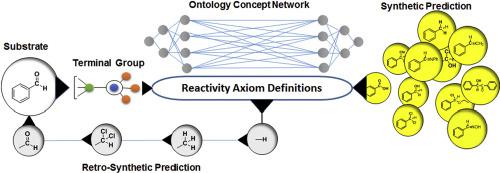Journal of Molecular Graphics and Modelling ( IF 2.7 ) Pub Date : 2020-07-24 , DOI: 10.1016/j.jmgm.2020.107691 K Umavathy 1 , P Sankar 1

|
Generic knowledge, related to fundamental organic reactivity is conceptualized and organized into model concept network resource. A concept of ‘terminal group’ is conceived to represent and encode reactivity of fundamental organic reactions such as substitution, elimination, addition, oxidation, reduction and condensation reactions. Chemical ontologies namely reactivity ontology, terminal group ontology, reagent ontology and skeletal carbon ontology are created to serve as domain knowledge repository. Graphical user interface is developed to compose various concepts of chemical ontologies to build generic reactivity axiom definitions in XML. Using the extendable and editable reactivity definitions, synthetic and retro-synthetic predictions are demonstrated with model applications.
中文翻译:

基于本体的概念模型用于预测基本的有机反应性。
与基本有机反应性相关的通用知识被概念化并组织为模型概念网络资源。“端基”的概念被认为代表并编码基本有机反应的反应性,例如取代,消除,加成,氧化,还原和缩合反应。创建化学本体,即反应性本体,端基本体,试剂本体和骨架碳本体,以作为领域知识库。开发了图形用户界面以组合化学本体的各种概念,以在XML中构建通用的反应性公理定义。使用可扩展和可编辑的反应性定义,可以在模型应用程序中演示合成预测和逆合成预测。










































 京公网安备 11010802027423号
京公网安备 11010802027423号